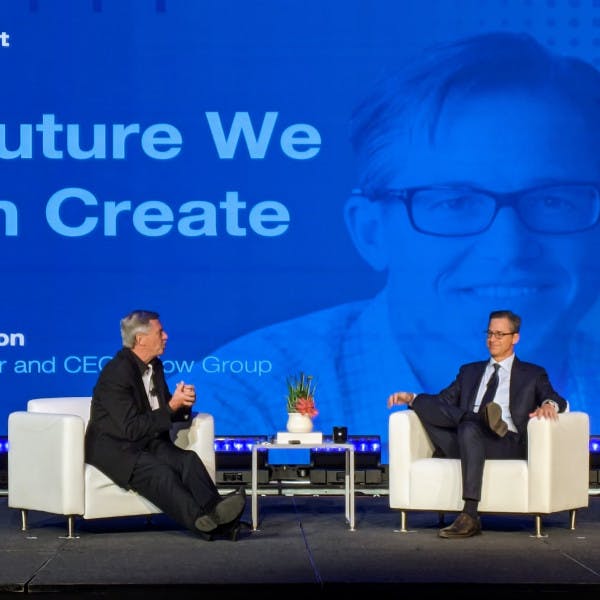Zillow CEO: ‘Keep your head down and deliver for your customers’
At the T3 Leadership Summit, Rich Barton discussed what’s in store for Zillow and the industry — and encouraged the audience to “resist the urge to chaos.”
Key points:
- Barton said Zillow is focusing on digital integration and moving “down the funnel towards the transaction” for revenue growth.
- He highlighted acquisitions of ShowingTime and Follow Up Boss as ways that Zillow is getting more involved in the agent business.
- Barton also shared how industries get through tough and chaotic times, noting the importance of moving forward.
SCOTTSDALE, Ariz. — When looking toward Zillow's future, CEO and Co-founder Rich Barton emphasized the company's tech-influenced past — and tech-heavy present — while speaking at the T3 Leadership Summit.
"Our roots, our genes are back at Microsoft," he told the audience, referring to his early experience working at the software giant during the '90s. "So we know and love the super geeky people, and we know how to create an environment where they thrive."
A digital, integrated Zillow — with an agent focus
Barton discussed Zillow's efforts to expand its digital offerings and diversify its revenue streams through acquisitions of products popular among agents. But expanding Zillow's focus beyond buyer leads is not coincidental — the industry continues to move in a direction where technology plays an increasingly important role, he explained.
In that future, Zillow needs agents as much as it needs consumers.
Barton said the company has made strategic decisions "in order to really affect the kind of digital change we knew in our hearts and in our brains that needed to happen in the real estate industry," he said, explaining that purchases of companies like ShowingTime and Follow Up Boss allowed Zillow "to move down the funnel towards the transaction."
Notably, Barton did not mention the oft-messaged "housing super app" concept — though he did allude to it while speaking about Zillow's efforts to automate and digitize the home purchase transaction.
"We're not just investing in the digital, integrated Zillow — which is kind of our little walled garden — we see a massive opportunity to digitize and offer an integrated set of services and tools platform for the industry as a whole."
He also noted that more than half of Zillow's $2 billion in revenue comes from streams other than its Premier Agent business. And expect to see further integration into agents' day-to-day business, he said, via new features planned for Follow Up Boss.
"Think about how much better Follow Up Boss is going to get when it's making smarter and smarter suggestions. It will basically become a copilot for agents," Barton said, explaining that the system will perform duties like finding listings for agents and nudging agents with reminders and other actionable items.
'Resist the urge to chaos'
Barton also discussed the sweeping changes coming to the industry and some of the confusion surrounding the NAR settlement. "We should resist the urge to chaos," he said to the crowd, suggesting that it's better to "keep our head down and keep our hands up" in moments of change or uncertainty.
He highlighted Zillow's efforts to engage and inform consumers of the changing real estate world and pointed audience members to Zillow's "Real Estate Rights for Consumers" — an effort which also doubles as a public commitment to buyer representation and transparency in the industry.
Barton offered some guiding principles via an acronym, ARC, which he said stood for access, representation and compensation. He added that "free, fair, transparent access to listings" is not only a cornerstone of Zillow's ethos, but something that makes the U.S. residential real estate model unique.
"It is an unbelievable asset of this industry that long ago we all decided to cooperate to share listings with each other," he said, garnering an applause. "Most countries do not have anywhere near the kind of transparency for consumers and professionals alike that we have in the U.S."
'Kill the squirrel'
But Barton also alluded to his time as the young CEO of Expedia during the 9/11 attacks. "There was speculation that no one would ever travel again," he said to the audience. "You know, it was a pretty scary time." Eventually, travel came back, he explained.
Another scary time? The pandemic. But "what happened to the industry during the first six months?" Barton asked. "Home run. Probably the biggest home run in our careers."
Barton also shared a story from when he was growing up in Connecticut and learning how to drive.
"I swerved to avoid a squirrel and almost had an accident," he explained. "And my dad took a deep breath, paused, and said, 'Son, kill the squirrel.' I would say it's good advice. In a chaotic time, what are you going to do? Keep your head down and deliver for your customers. Keep on driving."
